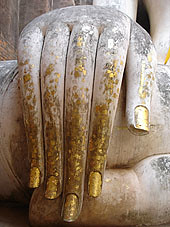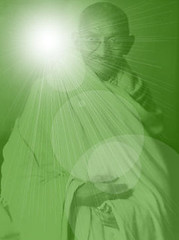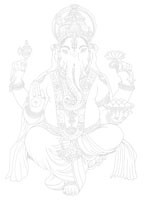The Golden Calf

Many in the West are familiar with the Biblical account of Moses and the Israelites. When Moses ascended Mt Sinai to receive the Ten Commandments from GOD, he was gone a very long time. The Israelites, without a leader, decided that they needed a idol to represent the gods that had delivered them from Egypt. Aaron gathered up the golden earrings among the people and a Golden Calf was made to make offerings to.
Of course, this false idol did not please GOD nor Moses. Moses destroys the original Ten Commandments tablets when he throws them to the ground and burns the Golden Calf in a fire.
The mind of man is weak and feable. Prophets and gods warn man not to construct plastic and stone monuments that only build walls between the higher level of consciousness and the external environment. It is from this level of consciousness, with feet off land, in a sea free of form, that mind unites and understanding begins. When man constructs the Golden Calf, when he holds strongly to the Golden Word, when he follows to the Golden Ritual, when he believes only to the Golden Tradition, he sinks down the base consciousness, the neighbor to simple logic.
"Oh, what a great sin these people have committed! They have made themselves gods of gold."
Moses knows no GOD of plastic or wood. He knows no GOD of form. A GOD of infinite being to one who has ascended Mt Sinai does not fit into empty ritual and will not be found in the same words after 2000 years. Man is man. Teachings are delivered to free the mind. They are a vehicle and must at one time be let go. If we hold onto the Golden Calf we will be burned up in the flames during its destruction.
We find similiar stories in many traditions. To modify an old Buddhist story, a master and his student are sitting in a stone temple. The old master asked the student to bring him a piece of wood. The student looks and only sees stone, a Buddha statue, candles, a rug, himself, and the master. No wood!
The master repeated the request.
After some time the student admited that he cannot find any wood in the room.
The master then read the student the Heart sutra, and upon hearing the words, "Emptiness is form, form is emptiness," the student saw the Buddha statue as a piece of wood.
Who is the Buddha Shakyamuni?
When did he live?
He was very clear that he wished no images to be made of him.
The student in the story understood why.
The walls were thick in his mind.
The mind of man is here and there. It sees the chair as a chair. It has only been a chair. It was never anything else. The world is only concepts. In this sort of world, religion becomes a concept. When there is Unity of Awareness... there is no chair... there is something beyond is and is not. When this understanding expands beyond the internal to the infinite, the light of consciousness shows the way to freedom.






































